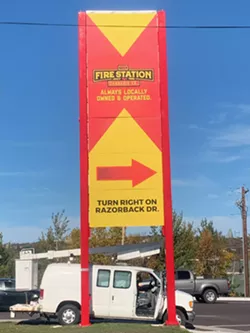
The owners of a cannabis company in Michigan’s Upper Peninsula say they feel they’re being unfairly targeted by city officials in a dispute over a roadside sign due to the nature of their business.
The Fire Station dispensary in Houghton says it leased all the available space on a sign structure owned by a company called S&W Real Estate in early November to advertise its store to motorists on the nearby highway. But shortly after the Fire Station ad went up, the City of Houghton sent a letter alleging the “violation of numerous sections” of the local zoning ordinance, including exceeding allowable height and square footage. The city also alleged that the stanchion was located on city property, and said it could find no evidence that Fire Station even had a right to place its sign there.
The Fire Station co-owner Logan Stauber says he finds it odd that the sign is raising red flags. The stanchion structure, located on Sharon Avenue, has been up for more than 30 years, and would have been in violation of the ordinance before the Fire Station ever even leased the space.
“What it felt like to me is that there were people that were unhappy with the content of the sign,” Stauber tells Metro Times. “You know, our colors are red and yellow, but to me, it’s no different than any other fast food sign. It felt like it could have potentially been the fact that we are a cannabis company.”
The letter also warned that the violations could result in the Fire Station’s cannabis license being revoked.
“The city of Houghton threatened our license, even though it’s our understanding that S&W is fully in the right here, and they’re allowed to advertise on the sign,” Stauber says. “But they threatened our license, even though we’re not the owners of the sign. It’s our understanding that the city has been collecting property tax on this billboard for decades.”
Houghton city manager Eric Waara insists the problem is not the sign’s content but rather the violations of the zoning ordinances, specifically the size requirements.
“Whether this was grandma’s quilt shop, a pet store, or in this case, it happens to be a cannabis retailer, there are numerous ordinance violations,” he tells Metro Times. “Whoever put that much signage up, they would have gotten pretty much the same letter.”
He adds, “It certainly wasn’t singling them out for being a certain type of business. It is the sign itself.”
Waara does concede that the city did receive complaints from residents over the sign’s content, however.
“Cannabis is certainly kind of a new thing, you know, for the average person,” Waara says, but adds that some residents who raised concerns about the sign didn’t even seem to know it was advertising a cannabis company.
Waara says the dispute is complicated by the fact that there are no records of the stanchion, which originally had a number of smaller signs on it to advertise businesses along the then-new highway. It appears to have been grandfathered in for decades.
“It’s one of those things that until you scratch the scab, you don’t even understand what’s there,” he says. “And that’s kind of the rabbit hole we’re in right now.”
Tony Ruiz, a legal counsel for the Fire Station, says he’s investigating the history of the sign, including deeds and property records. In the meantime, the Fire Station agreed to take the sign down.
“We are trying to work with the city, and the city is working with us to try to resolve these issues,” Ruiz says.
Stauber says he believes as a cannabis company, the Fire Station faces higher scrutiny from government officials than other businesses.
“When it comes to normal business activities, such as putting up a sign or even doing landscaping, because we are cannabis, we are held to a higher level and put under much scrutiny,” he says.
Stauber says the company has faced stigma from neighbors who don’t approve of its business ever since The Fire Station opened its first location in 2019 in Negaunee, when it became the first licensed dispensary in the Upper Peninsula. The company now has locations across the U.P., including in Marquette, Hannahville, and Sault Ste. Marie.
“When we first opened, there used to be a gentleman that would ride by our store every morning and flick us off on his bicycle, you know like, ‘Get a real job,’” he says. “But we’ve come a long way since then. We’re doing our best to change public perception. And for the people that [cannabis] helps, and the customers that really need our medicine and the products that that we sell from our stores, we have great reviews and we have a positive community.”
Stay connected with Detroit Metro Times. Subscribe to our newsletters, and follow us on Google News, Apple News, Twitter, Facebook, Instagram, or Reddit.







